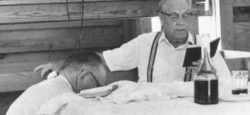The Divine Call
Primitive Baptist Preachers of North Louisiana
Published: December 1, 2015
Last Updated: June 29, 2021
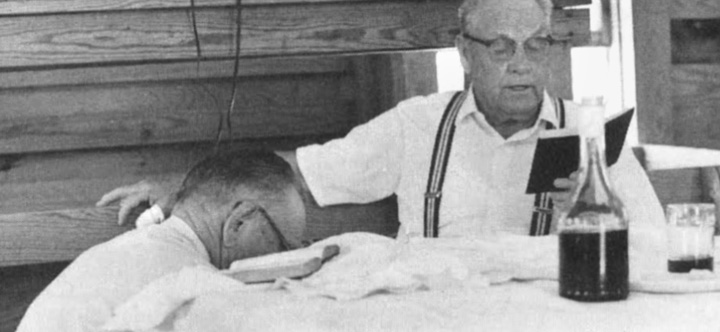
Editor’s Note: The Louisiana Endowment for the Humanities honored Susan Roach, Ph.D., with its 2015 Lifetime Achievement Award at the Bright Lights Awards Ceremony on April 23, 2015. Roach served as a folklorist with the Louisiana Regional Folklife Program from 1998-2009. She is now director of Language and Literature and professor of English at Louisiana Tech University in Ruston.
In 1984 she interviewed two ministers of the Oak Grove Primitive Baptist Church, a rural church in Winn Parish. The men reveal the worldview of Primitive Baptists and their spiritual testimonies offer parallel mystical experiences and transitional orderals undergone by these men upon their conversions when they received the call to preach.
Unlike many Protestant denominations, ministers of the Primitive Baptist Church, a fundamentalist sect which believes in absolute predestination, are not required to attend a seminary. Instead, they are “called by God” into the role of preacher through a long spiritual ordeal.
According to two such ministers from North Louisiana — “Elder Godwin” and “Elder Mercer,” as they are addressed by church members of the Oak Grove Primitive Baptist Church in Winn Parish—the role of the Primitive Baptist minister is primarily to speak words of comfort to “the flock” through poetic sermons which are chanted and formulaic in form. Unlike most denominations, which pay their ministers, the only renumeration received by the Primitive Baptist ministers is the reciprocal comfort they receive by giving God’s children comfort.
Primitive Baptists also differ from other Baptist groups in that the ministers and other members do not seek to convert others, since the Primitive Baptists do not believe in proselytizing. They believe that God has determined before the creation of the world who is predestined to salvation; therefore, any missionary attempts to convert nonbelievers is both useless and offensive.
Researchers outline the background of the Primitive Baptists, noting that the sect grew out of the anti-missionary movement in the late 1800s when some Baptist groups resented attempts by the church government to demand mission support from the various member churches. Because they resisted fellowship with other mission-oriented Baptists, these church members were termed “Hardshells.” Interestingly, Mercer and Godwin attribute the term to the fact that members of the sect have a difficult time being converted, that they are hard for the Lord to reach.
Like other Primitive Baptists, the Oak Grove church meets one or two weekends per month on Saturday and Sunday. Services begin with singing from hymnals which contain words, only without musical notation. The song service is followed by prayer. Then, depending on the ministers present, one or two sermons are delivered.
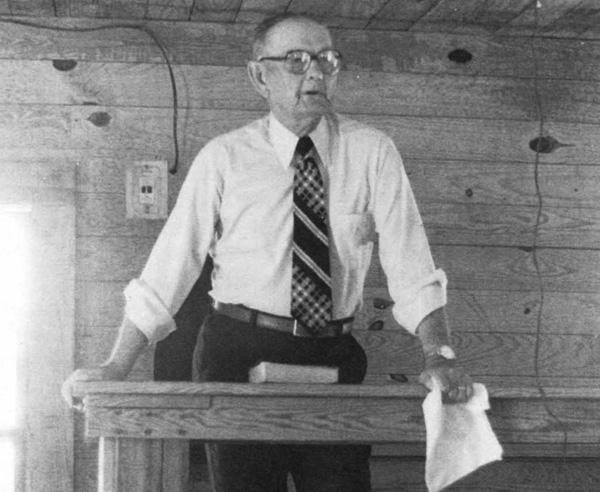
Hilton Mercer preaches a formulaic sermon.
Ministers typically begin their sermons “speaking naturally,” and then they begin chanting their formulaic sermons.
This type of preaching, typically done by a folk preacher, is dependent upon Divine power. According to researcher Bruce Rosenberg, who has studied the callings of American folk preachers, “a person may be called to do the Lord’s work, but to preach requires ‘spiritual power.’ This feeling that one is divinely summoned is important in understanding sermon techniques. Only spiritual power allows one to preach well; that can only come from God…” Mercer confirms this: “Can’t no man preach. Preaching is done by the Spirit. The man—it’s just done through him … we are just an instrument in the hands of the almighty God, that through us he sends that unto his children; we deliver that that is delivered unto us.”
Rosenberg also notes that folk preachers undergo stages of development. As young children, these potential ministers sit in church, absorbing the stories, melody, and rhythm of the pastor’s preaching. As they grow older, they attend church more frequently and take on roles such as deacon, delivering short prayers and short sermons before finally taking their own church.
Godwin and Mercer’s conversions, which gave them “the call” to speak in the church, took both men through similarly arduous rites of passage, requiring them, as they metaphorically expressed it, “to go to the depths of Hell.”
Straight is the Gate
Their conversion stories are ones of psychological crises and threatening accusations of insanity endured before accepting their calls from God to lead a church. Both withdrew from their families and friends who were nonmembers for a period of time, and were drawn to church. Although neither minister had joined the Primitive Baptist Church before the conversion which called him to preach, both had fond feelings and affective attachments for the church through family members.
‘’I’ve always had a love for the Primitive Baptist people,” says Mercer, “because I was raised amongst them and I knew quite a bit about them, but I still didn’t know anything. I had been going and sitting under the sound of their voice, but I didn’t understand the doctrine because I wasn’t given to understand it by the spirit of God.”
Mercer, in his story of his conversion, recalls feelings of anxiety, tension, and dissatisfaction, before accepting his calling: “I was at my work [at the mill] and something overshadowed me, and I was made to know … that all of my sins and everything I had ever done come before me, and I realized something was wrong; I didn’t know what it was…
“See, I lived a pretty hard life …I was bad to drink; in fact, I stayed drunk one time for about six months in my life, and I drank just about every day of my life. But all of that, the desires of all of that, left me just like that …
“Well, my wife and kids was in the Methodist Church … I knew that I wanted to hear some preaching; I wanted to do something. I said ‘Well, I’ll go to church with them.’ Every time I planned to go to church with them, there was something that got in my way and I couldn’t go, … and I went on for a long time and I got so bad that it got to where I’d hide from people, didn’t want to be around people. [At work] if I didn’t have that dragline in motion, I’d get back there and hide behind the motor.
“I was like that for a good while … six months, I imagine. I couldn’t get myself reconciled … You know, I kept getting in deeper trouble, just deeper trouble … spiritual trouble.”
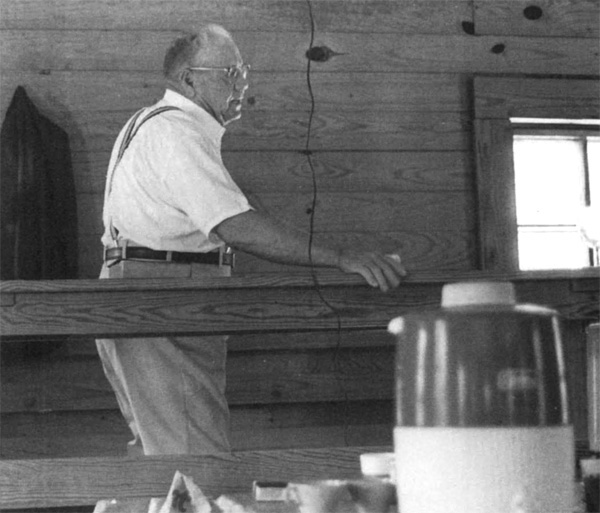
David Godwin behind the pulpit at the Oak Grove Primitive Baptist Church.
An intense interaction with the minister at the church heightened his crisis: “ … I come in from work one Saturday afternoon; my dad lived with me, made his home with me and my brother, and they was sitting on my front porch, and I walked in, and they told me, … ‘Old Brother Lambert is going to be at Mount Olive Church . . . Do you feel like going?’
“I said, ‘ Yeah, I believe I would.’ … Brother Lambert got up and made a few remarks. He read a little bit in the Bible … said that all things work together for good for them that loves the Lord … He started from that, and he preached about an hour and fifteen minutes. He didn’t take his eyes off me from the time he started until he finished. Well, that was the first sermon I had ever heard a hardshell preacher preach. As many times as I had been under the sound of their voice, I had never heard them preach. And that was the first that I’d ever heard any preaching since the beginning of my experience that satisfied me …”
Conversion and Calling
At this point in his life, having had intense interaction with the preacher through concentrated eye contact, Mercer rationally accepted the sermon, but he had not yet reached his ultimate conversion. He underwent emotional trials and an authenticating mystical, visionary religious experience to assure him of his calling.
“… I got to where I was losing a lot of sleep. I got to where I would walk the floor a lot at night, shed tears, and I got in a terrible shape. Well, one night I had a dream or a vision whichever you want to call it, in my sleep. I dreamed that I was an old bending man, gray-headed. I saw myself just as plain as I am looking at you, and I was in the pulpit preaching. And I don’t know what I was preaching, but I was preaching real hard … and the pulpit down there at Oak Grove was where I was at … So I woke up, and there was an awful burden on me, an awful burden, and the burden was to preach the gospel and to comfort God’s children. Well, I vowed that I wouldn’t do that; I didn’t belong to the [Primitive Baptist] church … So I said, ‘I’ll show them something … I won’t have to preach if I don’t join the church.’ ”
Still, the inner torment continued for Mercer.
“So one night I was in deep trouble; I hadn’t slept any, and along about midnight, maybe after, I’d shed tears all night, maybe walked the floor; I was in awful shape. My wife, she couldn’t sleep … She says, ‘I’m goin’ to get up and make you some coffee.’
“I said, ‘Baby, coffee won’t do me no good.’ She said, ‘ Well, what in the world is wrong with you? I want to know.’
“I said, ‘I been called to preach.’ I said, ‘I’ll die and go to the bottom pits of hell before I’ll preach… .’
“I was no fit subject to go before God’s people to proclaim the doctrine, to stand on the walls of Zion and cry aloud and spare not the things He asked for His children.
“[My wife], she says, ‘Well, I’m goin’ tell you one thing: if you’re called to preach, you just as well to get at it because you’re gon’ have it to do.’
“Anyway, I said that I would not preach. I wasn’t goin’ to do that. I went every time [to church] … And I really enjoyed it … The little old church over here was not active for a while; it was down because there was no pastor there. They got a little old preacher from out there in East Texas —Brother Wilburn Morris come in there, and he come up there and took over, but he had had a vision, … and he had saw me and Brother David in this vision as ministers. And the first time that he saw me, when I walked around the corner of that building there … He said, ‘There comes a man that I saw in a vision … he’s a hardshell preacher.’
“I said, ‘No, I’m not.’ I walked on up. Well, during conference, they started singing ‘Amazing Grace’ and extended the privilege of the church. I got up to go on outside, and I landed in [Morris’s] arms and asked him for a home in the church.”
Mercer, in his ultimate surrender to his predestined role, lost control of his body. Intending to go out the door, he instead found his feet taking him in the opposite direction, to the altar.
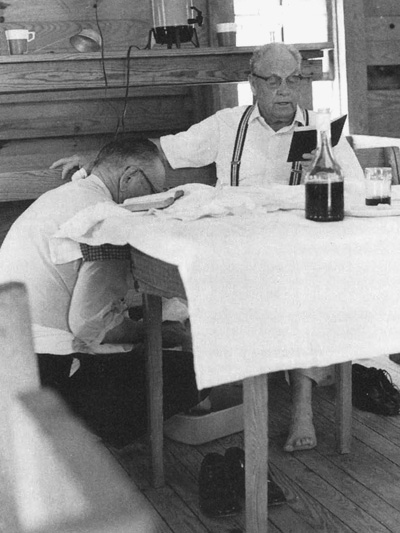
During a religious ceremony based on the Biblical scripture in which Jesus washed his apostles’ feet, “Elder” Mercer washes the feet of “Elder” Godwin at the Oak Grove Primitive Baptist Church in Winn Parish.
Many Paths, Same Goal
Elder Godwin’s conversion narrative mirrors Elder Mercer’s in many ways, but where Mercer had dreams about his destiny, Godwin had visions. Like Mercer, Godwin also was searching for religious answers before he had his ultimate conversion experience.
Godwin’s youth spent in the Primitive Baptist Church influenced his search: “We were living over there at the mill. I’d talk it—the religion—to my wife, my sister, and all them over there at the mill. I was trying to convert people, I guess, so one day I went out to one of the members of that church, Pentecost, and I told him, ‘Let’s go pray.’ How in darkness [I was]! It felt like I was in a dungeon, so we went and he prayed and I couldn’t! I tried, but I couldn’t. I went back to my sister’s house and drank a cup of coffee. When I did, well, this light, just like it was, I guess, with the Apostle Paul, I don’t know; it was just everything opened up to me, and they said I preached a hardshell sermon … Of course, I wasn’t aware of all that was going on. It just came out; I had nothing to do with it whatsoever, it just rolled out just as quick as it come to me. That was the starting of it.”
However, he learned that his experience with the chanted sermon did not fit into the religious framework of Pentecostal beliefs (his sister’s faith), where sermons given by the Holy Spirit are characterized by “speaking in tongues.” Although he did not fit with this religious group, friends’ questions led him to the church where his experience was understood:
“They said, ‘Did you speak in tongues?’ I said, ‘I preached a hardshell sermon.’ They said, ‘That ain’t the right kind of Holy Ghost.’ I told them, ‘Well, that was the way it came to me.’ ”
“So they asked me where I was called then … I said, ‘Over at Oak Grove [Primitive Baptist Church]’ … Naturally, I thought at the time that I was in good shape; I wouldn’t have to worry anymore, but that was just the starting of it … When that light shown on me, I thought I was all right then. I just thought I was feeling so happy. But it came back, and I didn’t want to preach. No, no! There was no way I was going to preach. I run from it just as hard as I could go. Tried to keep out from it, but it caught up with me … I was preaching all the time, and I couldn’t stop hardly, and everybody that’d come to me, I’d preach to them. There were lots of times [I’d preach] to just things out yonder; I get out there and run upon a squirrel, or something like that, I’d preach to it just like if I was preaching to anything else. You gotta go crazy first before you can be a minister. I’ll tell you that. They talked about taking me to the asylum. Naturally they wouldn’t … I stayed in the woods most of the time; I prayed all the time. I’d come in, and my wife, she couldn’t stand me, and I’d get out.”
When asked why he spent time in the woods, Godwin replied, “I didn’t feel fit to be around anybody; I didn’t feel worthy. I felt like every sin I had ever done come up before me, and I just didn’t feel worthy to be around people.” This near-conversion state of self-induced isolation and misery continued for a long period. Throughout his period of isolation, however, Godwin felt that he himself had nothing to do with working through the problem, but that the “spirit” was working for him. Godwin ended his torture with an unusual water baptism: “Well, I didn’t work, the spirit worked for me. It just took time. Finally, they baptized me and ordained me as a deacon for two or three years. Even after they baptized me, I wasn’t satisfied … I said, ‘Well, I think I’ll go baptize myself.’ That’s just how crazy I was. So I went up to the mill creek. There was a big black moccasin; I got me a club and run it off and waded off out there and crossed my arms. I said [to myself], ‘I baptize you, brother, in the name of the Father, Son, grace, and the Holy Ghost,’ and I went under.
“Well, I wasn’t satisfied with that, so it was coming up a cloud from in the west, it was a’thundering and lightning, and I was way back off down the creek, so it just come to me: ‘Well, if I can just get over that fence, over that line into my land, and it comes a’raining on me, then God will baptize me.’ That was going through my mind, and sure enough, I did: I made it over on my land and it rained and got me wet and I’s pretty well satisfied then. Naturally, as time went on, why, I got more reconciled to it, and that faded away. And then they ordained me as a minister.”
Both ministers agreed that when they were experiencing their religious callings, they were unsure of their sanity, and neither had ever heard of anyone else undergoing such experiences. However, they later learned from others that their ordeals were typical of members of their faith.
According to the ministers, after their baptism, which liberates them to speak, they are given opportunities to preach in the pulpit. Anywhere from two to six months might pass between liberation and ordination, however, depending on the “kind of gift you had.”
Godwin describes the next step in the ordination process: “If you was gifted and really preached a sermon, then they would ordain you. But if you got up there and talked and the spirit didn’t hit you just right, and if you didn’t bring the right kind of message, they would wait and try you again later on. But whenever it hit you and you preached a sermon, then they knew it; then they ordained you …” Thus to complete the stages of their development, the ministers cross from the second stage with their beginning sermons, to the third stage where they are officially ordained ministers and competent to perform.
Detailing the events from their initial religious crisis to their ordination, Mercer and Godwin’s conversion stories demonstrate dramatically the ways in which their religious mystical struggles authenticate the spiritual calling. The Primitive Baptist belief that God chooses “the elect” calls for intense, unmistakable signs that one has indeed been chosen.
Initially, both men had mystical experiences which told them of their new destiny. Both men, having received calls around age forty, actively fought against the call, vowing upon vows that that they would rather “go to the bottom pits of hell before preaching the gospel.” In spite of their resistance, both men found themselves destined to become ministers, especially after hearing another Primitive Baptist minister’s account of a mystical vision he had of both of them as ministers of the Oak Grove Church, which was in search of a minister at that time. With such authentication of their new roles, both men were compelled to answer the call and, thus, were given access to the speaking role of preacher, who, as an “instrument of the almighty God … comforts the flock,” and serves the Primitive Baptist Church with chanted sermons.
——
This article was excerpted from a scholarly paper titled ‘You Gotta Go Crazy First Before You Can Become a Minister:’ Accessing a Speaking Role in the Primitive Baptist Church, published in The Louisiana Folklore Miscellany, 1993, Volume 8.
Susan Roach received her PhD. in Anthropology (Folklore) from the University of Texas in 1986, and her M.A. and Ph.D. in English from the University of Arkansas. A North Louisiana native, she began documenting North Louisiana folk traditions in 1978, and has curated museum exhibitions of quilts and folk arts, published articles and monographs on regional folklife, and chaired the Louisiana Folklife Commission. She collaborated with other scholars to produce Delta Pieces, an online book documenting folk traditions in the delta parishes of northeast Louisiana.
The Louisiana Folklore Miscellany is published by the Louisiana Folklore Society, which was founded in 1956 to promote the study and appreciation of Louisiana’s folk cultures. Subscription is by membership in the society. Join the Louisiana Folklore Society’s Facebook page to stay up to date on the society’s events.
